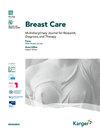内分泌治疗:从卵巢消融到个体化治疗和信号抑制
IF 2.1
4区 医学
Q2 OBSTETRICS & GYNECOLOGY
引用次数: 0
摘要
& lt; b> & lt; i>背景:& lt; / i> & lt; / b>19世纪末,乔治·托马斯·比特森爵士(Sir George Thomas Beatson)首次发现双侧卵巢切除术对晚期女性乳腺癌病变发展的积极影响。从那时起,内分泌治疗一直是治疗早期(EBC)和晚期(MBC)激素受体(HR)阳性乳腺癌的关键组成部分。& lt; b> & lt; i>简介:& lt; / i> & lt; / b>这篇综述讨论了这种治疗方法的演变,从高剂量雌激素治疗的引入到几种抗雌激素治疗的发展。近年来,新一代药物包括选择性雌激素受体调节剂、口服选择性雌激素受体降解剂(serd),以及更独特的药物,如完全雌激素受体拮抗剂、靶向嵌合蛋白水解剂和选择性雌激素受体共价拮抗剂。这些药物正在不同水平的随机临床试验(rct)中进行评估,以评估早期和转移性情况。截至目前,EBC的选择范围从短期新辅助内分泌治疗到监测Ki-67对MBC联合内分泌治疗的反应性,在伴有种系BRCA1/2突变的腔内乳腺癌患者中引入了内分泌治疗和CDK4/6抑制以及PARP抑制的联合治疗。全球随机对照试验的结果被纳入全球和本地指南,以优化我们的腔内EBC患者的个体化治疗。& lt; b> & lt; i>关键信息:& lt; / i> & lt; / b>激素敏感性乳腺癌的内分泌干预仍然是早期和转移性乳腺癌的最重要的选择之一。本文章由计算机程序翻译,如有差异,请以英文原文为准。
Endocrine Therapy: From Ovarian Ablation to individualized therapy and signal inhibition
Background: At the end of the 19th century, Sir George Thomas Beatson first discovered the positive influence of a bilateral oophorectomy on the development of breast cancer lesions in women with advanced disease. Since then, endocrine therapy has been a key component of the treatment of both early (EBC) and advanced-stage (MBC) hormone receptor (HR)-positive breast cancer. Summary: This review discusses the evolution of this therapeutic approach from the introduction of high-dose estrogen therapy leading to the development of several antiestrogen therapies. Recently, the new generation of drugs includes selective estrogen receptor modulators, orally administered selective estrogen receptor degraders (SERDs), as well as more unique agents such as complete estrogen receptor antagonists, proteolysis targeting chimeric, and selective estrogen receptor covalent antagonists. These drugs are under evaluation in various levels of randomized clinical trials (RCTs) being evaluated in both early and metastatic settings. As of today, the options in EBC are ranging from short-term neoadjuvant endocrine therapy to monitor the responsiveness of Ki-67 to combined endocrine therapy in MBC, introducing the combination of endocrine therapy and CDK4/6 inhibition as well as PARP inhibition in patients with luminal breast cancer presenting with germline BRCA1/2 mutations. The results of global RCTs are settled in global and local guidelines to optimize the individual therapy of our patients with luminal EBC. Key Messages: Endocrine intervention in hormone-sensitive breast cancer remains one of the most important options in all settings of early and metastatic breast cancer.
求助全文
通过发布文献求助,成功后即可免费获取论文全文。
去求助
来源期刊

Breast Care
医学-妇产科学
CiteScore
4.40
自引率
4.80%
发文量
45
审稿时长
6-12 weeks
期刊介绍:
''Breast Care'' is a peer-reviewed scientific journal that covers all aspects of breast biology. Due to its interdisciplinary perspective, it encompasses articles on basic research, prevention, diagnosis, and treatment of malignant diseases of the breast. In addition to presenting current developments in clinical research, the scope of clinical practice is broadened by including articles on relevant legal, financial and economic issues.
 求助内容:
求助内容: 应助结果提醒方式:
应助结果提醒方式:


